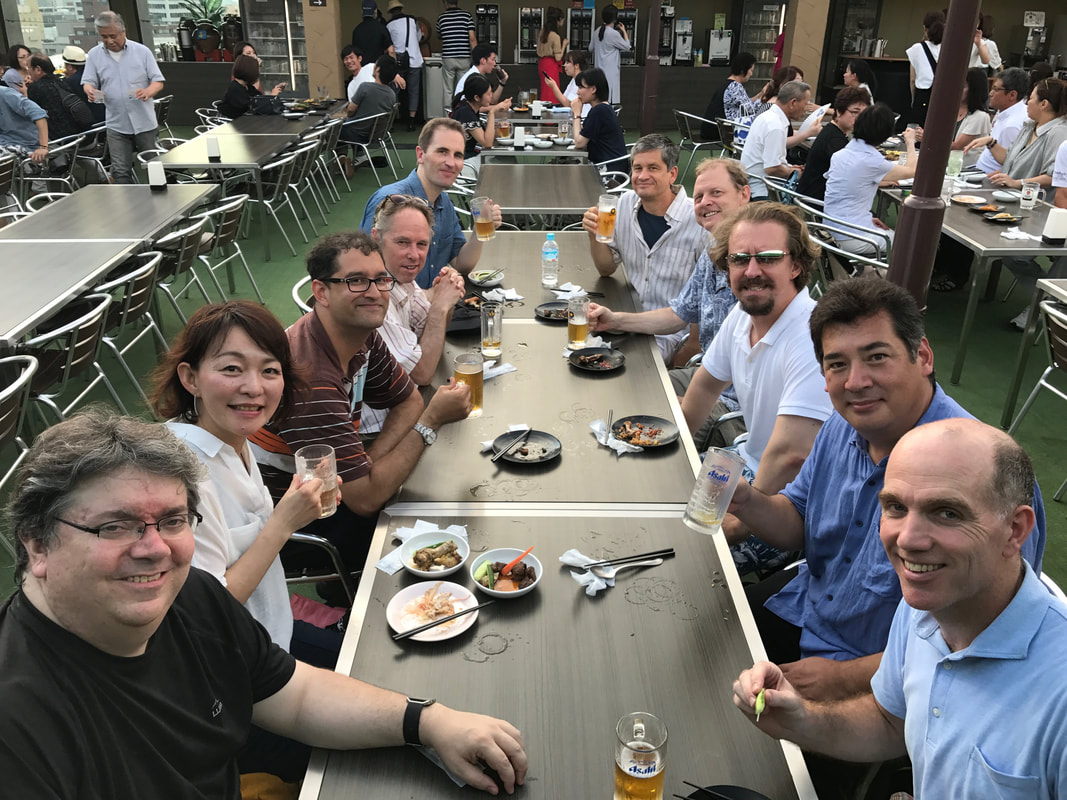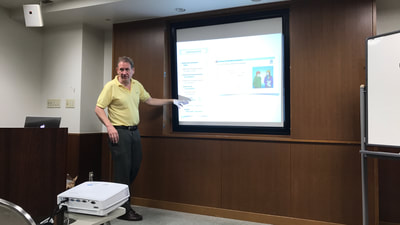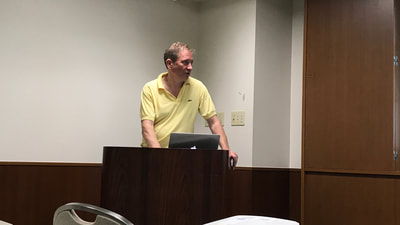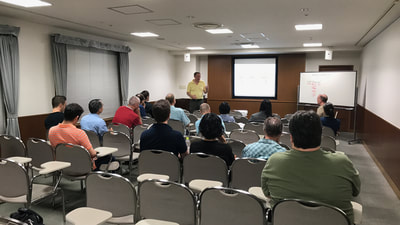January 28, 2017 (Saturday)
Self-determined language teaching: What it means and how to do it
Speakers: Quint Oga-Baldwin & Neil McClelland
January 28, 18:00-20:00
ACROS Fukuoka Seminar Room 1 (2nd Floor) access
Social:Grand China ACROS B1F 20:00~(Order stop 21:30)
3,000yen/person, maximum 15people.
RSVP by 1/25 : Miho Tani: [email protected]
PLEASE NOTE, because the social meal is completely unrelated to JALT finances, any person cancelling their reservation after the specified deadline, or not showing up, will be asked to pay the full amount, unless a replacement is found.
Self-determination theory describes human motivation in terms of how individuals control their lives and environments. Central to this theory is the concept of autonomy, the sense that our actions are internally directed. In this presentation, we will discuss how teachers can make their classrooms places of autonomous learning. We offer clear definitions and examples of self-determined teaching and learning, and then present recent research findings which corroborate these ideas. These findings will be used to make clear recommendations for teachers on how to create an autonomous, self-determined learning environment for all levels of language classes.
Biography: Quint Oga-Baldwin has taught at every level of the Japanese education system. He currently trains future elementary and junior high school teachers. His research interests include elementary foreign language education, student engagement and motivation, and teacher education.
Neil McClelland is an Associate Professor at the University of Kitakyushu and has more than twenty years of experience teaching in Japan. Research interests include language learning motivation and the application of Psychology in Applied Linguistics.
Self-determined language teaching: What it means and how to do it
Speakers: Quint Oga-Baldwin & Neil McClelland
January 28, 18:00-20:00
ACROS Fukuoka Seminar Room 1 (2nd Floor) access
Social:Grand China ACROS B1F 20:00~(Order stop 21:30)
3,000yen/person, maximum 15people.
RSVP by 1/25 : Miho Tani: [email protected]
PLEASE NOTE, because the social meal is completely unrelated to JALT finances, any person cancelling their reservation after the specified deadline, or not showing up, will be asked to pay the full amount, unless a replacement is found.
Self-determination theory describes human motivation in terms of how individuals control their lives and environments. Central to this theory is the concept of autonomy, the sense that our actions are internally directed. In this presentation, we will discuss how teachers can make their classrooms places of autonomous learning. We offer clear definitions and examples of self-determined teaching and learning, and then present recent research findings which corroborate these ideas. These findings will be used to make clear recommendations for teachers on how to create an autonomous, self-determined learning environment for all levels of language classes.
Biography: Quint Oga-Baldwin has taught at every level of the Japanese education system. He currently trains future elementary and junior high school teachers. His research interests include elementary foreign language education, student engagement and motivation, and teacher education.
Neil McClelland is an Associate Professor at the University of Kitakyushu and has more than twenty years of experience teaching in Japan. Research interests include language learning motivation and the application of Psychology in Applied Linguistics.
February 25, 2017 (Saturday)
Bringing the World to Your English Classroom Easily via Online Exchange
Speaker: Eric Hagley
ACROS Fukuoka,
Social: Grand China
Abstract: Virtual Exchange (VE) has many benefits for foreign language teachers and their students but it is still not easily accessible to the mainstream. Students in English as a foreign language classrooms often have few opportunities to physically interact with other users of English. VE gives them virtual mobility, enabling them to participate in a global community. In this presentation the author introduces a large scale VE which includes over 1500 students from 5 countries in a VE via a Moodle platform. Students interact online in English as a lingua franca. Exchanges are carried out over 8 week periods. Outcomes from the project, sponsored by the Japanese Ministry of Education, will be outlined using data gained from questionnaires, text analysis and student feedback. Details of how this method of VE could bring it into mainstream, ensuring VE can become a part of any English communication class throughout the world, if the teacher so wishes, will be outlined in addition to an outline of problems that can eventuate and ideas for incorporating the VE into classroom practice. Those attending will also be able to participate in a quick workshop so that if they want to join the exchange from April 2017, they will be able to.
Bio: Eric Hagley teachers EFL at Muroran Institute of Technology in the north of Japan. He created the large scale virtual exchange being presented here and has had his students doing VE for the past 12 years. He is the Chair of the Asia Pacific Virtual Exchange Association (APVEA) and in this position is trying to ensure that VE can become mainstream in language classes everywhere. He is also head of the Quiz Quality Assurance Project for MoodleReader (mReader).
Bringing the World to Your English Classroom Easily via Online Exchange
Speaker: Eric Hagley
ACROS Fukuoka,
Social: Grand China
Abstract: Virtual Exchange (VE) has many benefits for foreign language teachers and their students but it is still not easily accessible to the mainstream. Students in English as a foreign language classrooms often have few opportunities to physically interact with other users of English. VE gives them virtual mobility, enabling them to participate in a global community. In this presentation the author introduces a large scale VE which includes over 1500 students from 5 countries in a VE via a Moodle platform. Students interact online in English as a lingua franca. Exchanges are carried out over 8 week periods. Outcomes from the project, sponsored by the Japanese Ministry of Education, will be outlined using data gained from questionnaires, text analysis and student feedback. Details of how this method of VE could bring it into mainstream, ensuring VE can become a part of any English communication class throughout the world, if the teacher so wishes, will be outlined in addition to an outline of problems that can eventuate and ideas for incorporating the VE into classroom practice. Those attending will also be able to participate in a quick workshop so that if they want to join the exchange from April 2017, they will be able to.
Bio: Eric Hagley teachers EFL at Muroran Institute of Technology in the north of Japan. He created the large scale virtual exchange being presented here and has had his students doing VE for the past 12 years. He is the Chair of the Asia Pacific Virtual Exchange Association (APVEA) and in this position is trying to ensure that VE can become mainstream in language classes everywhere. He is also head of the Quiz Quality Assurance Project for MoodleReader (mReader).
April 22, 2017 (Saturday)
Easing the burden of record-keeping
Speaker: Soren Leaver
18:00-20:00
NEW VENUE TRIAL: NAMIKI Square, Chihaya なみきスクエア千早駅JR
Address: 〒813-0044, 福岡市東区千早4丁目21番45号(千早駅西側 West exit side of Chihaya JR station )
from Tenjin it's a 12 minute Chikatetsu ride to Kaizuka followed by 3 minute Nishitetsu to Chihaya.
Hakata Ichiban dori : 福岡市東区千早3--6-37 香椎スポーツガーデン1F
In addition to lesson planning and instruction, teachers often spend a considerable amount of time maintaining student records. The bulk of this recordkeeping relates to assessment, and requires precision and attention to detail. Without a solid grasp of the technological resources available, this process can become repetitive, time consuming, and draining.
This presentation will introduce features of Microsoft Excel and Google Docs that have the potential to ease burdensome aspects of recordkeeping. In the first part of the presentation, the presenter will show how to create a fully automated gradebook in Excel using relative and absolute cell references. In the second part, he will show how Google Docs can be used, in concert with learners’ smartphones, to collect, correct, and analyze answers from quizzes. Participants are encouraged to bring laptops or tablets to the presentation for the sake of shadowing the presenter.
Biography: Soren Leaver is originally from Berkeley, California, and has been living in Japan for the past decade. He has taught at various high schools and universities in Fukuoka and is currently a lecturer at Kyushu Sangyo University.
Easing the burden of record-keeping
Speaker: Soren Leaver
18:00-20:00
NEW VENUE TRIAL: NAMIKI Square, Chihaya なみきスクエア千早駅JR
Address: 〒813-0044, 福岡市東区千早4丁目21番45号(千早駅西側 West exit side of Chihaya JR station )
from Tenjin it's a 12 minute Chikatetsu ride to Kaizuka followed by 3 minute Nishitetsu to Chihaya.
Hakata Ichiban dori : 福岡市東区千早3--6-37 香椎スポーツガーデン1F
In addition to lesson planning and instruction, teachers often spend a considerable amount of time maintaining student records. The bulk of this recordkeeping relates to assessment, and requires precision and attention to detail. Without a solid grasp of the technological resources available, this process can become repetitive, time consuming, and draining.
This presentation will introduce features of Microsoft Excel and Google Docs that have the potential to ease burdensome aspects of recordkeeping. In the first part of the presentation, the presenter will show how to create a fully automated gradebook in Excel using relative and absolute cell references. In the second part, he will show how Google Docs can be used, in concert with learners’ smartphones, to collect, correct, and analyze answers from quizzes. Participants are encouraged to bring laptops or tablets to the presentation for the sake of shadowing the presenter.
Biography: Soren Leaver is originally from Berkeley, California, and has been living in Japan for the past decade. He has taught at various high schools and universities in Fukuoka and is currently a lecturer at Kyushu Sangyo University.
May 28, 2017 (Sunday)
Online English Learning: Resources, Activities and Evidence
Speaker: Paul Raine
Sponsored by JALT CALL SIG
14:30 - 16:30
Tenjin, Fukuoka City: Kurume University Satellite Campus.
The presenter will argue in favor of a move toward online English learning and teaching resources and activities. He will highlight how computer software can enable learners to build up portfolios of evidence for their language studies, and offer freedom and autonomy not possible through other study means. The presentation will be followed by an introduction of Apps 4 EFL (www.apps4efl.com), a free, cross-device compatible Web-Based Language Learning platform developed by the presenter.
Abstract:
As English language teachers, our day-to-day profession consists of three main strands: creating resources, administering activities, and gathering evidence of learning from students. These three strands tend to be present no matter what theoretical approach to teaching we adopt.
In recent years, we are seeing a move toward online learning for a vast array subjects, and language learning is no exception. Learner Management Systems (LMS) such as Moodle are used by the majority of academic institutions, and there are a wide range of online resources and activities available to English language learners.
There has yet to emerge, however, an online platform designed specifically for teachers and learners of English as a Foreign Language. Such a platform should of course provide class management functions, and digital resource distribution facilities. However, it should also provide digital activities specifically geared toward learning EFL, and a way for teachers to track their students progress in these activities. These activities should take advantage of the latest web technologies, including text-to-speech and speech recognition.
This is where Apps 4 EFL (http://www.apps4efl.com) steps in. Apps 4 EFL is a free, cross-device compatible Web Based Language Learning (WBLL) platform developed by the presenter. It aims to bring a range of online English learning activities under one roof, and allow students to study autonomously at any time, in any place, whilst also allowing teachers to track and control their students' learning in detail.
Online English Learning: Resources, Activities and Evidence
Speaker: Paul Raine
Sponsored by JALT CALL SIG
14:30 - 16:30
Tenjin, Fukuoka City: Kurume University Satellite Campus.
The presenter will argue in favor of a move toward online English learning and teaching resources and activities. He will highlight how computer software can enable learners to build up portfolios of evidence for their language studies, and offer freedom and autonomy not possible through other study means. The presentation will be followed by an introduction of Apps 4 EFL (www.apps4efl.com), a free, cross-device compatible Web-Based Language Learning platform developed by the presenter.
Abstract:
As English language teachers, our day-to-day profession consists of three main strands: creating resources, administering activities, and gathering evidence of learning from students. These three strands tend to be present no matter what theoretical approach to teaching we adopt.
In recent years, we are seeing a move toward online learning for a vast array subjects, and language learning is no exception. Learner Management Systems (LMS) such as Moodle are used by the majority of academic institutions, and there are a wide range of online resources and activities available to English language learners.
There has yet to emerge, however, an online platform designed specifically for teachers and learners of English as a Foreign Language. Such a platform should of course provide class management functions, and digital resource distribution facilities. However, it should also provide digital activities specifically geared toward learning EFL, and a way for teachers to track their students progress in these activities. These activities should take advantage of the latest web technologies, including text-to-speech and speech recognition.
This is where Apps 4 EFL (http://www.apps4efl.com) steps in. Apps 4 EFL is a free, cross-device compatible Web Based Language Learning (WBLL) platform developed by the presenter. It aims to bring a range of online English learning activities under one roof, and allow students to study autonomously at any time, in any place, whilst also allowing teachers to track and control their students' learning in detail.
June 11, 2017 (Sunday)
Turning Speaking Tasks Into Assessment Activities
Speaker: Jerry Talandis Jr. (University of Toyama)
Sponsored by ALMA publishing
VENUE : Seinan Community Center, 1st Floor, Multi-purpose room 2 (ACCESS)
One effective way to assess your students' speaking skills is to turn regular language practice tasks into tests. To do that, all you really need is some sort of feedback loop that provides insight into performance. With such a loop, common practice activities can be turned into assessment activities (Brown, 2013). Such an approach to oral testing can potentially open up new ideas for assessment that help your students improve their speaking ability.
In this practical, theory-driven presentation, we'll cover various strategies for creating such loops by looking at the pros and cons of typical holistic and analytic marking schemes. Guidance for creating effective feedback/marking rubrics will also be provided. Finally, practical issues regarding administration of in-class speaking tests will also be addressed. No previous experience with conducting speaking tests is required; any teacher interested in learning how to implement oral testing in the classroom is encouraged to attend.
Reference: Brown, J.D. (Ed.) (2013). New ways of classroom assessment, revised. Alexandria, VA: TESOL.
Jerry Talandis Jr. has been teaching English in Japan since 1993 and is currently a professor at the University of Toyama. His research interests include pragmatics, materials design, language testing, and professional development through classroom-based research. He is also co-author of the textbook Conversations in Class, 3rd Edition and How to Test Speaking Skills in Japan: A Quick-Start Guide.
Turning Speaking Tasks Into Assessment Activities
Speaker: Jerry Talandis Jr. (University of Toyama)
Sponsored by ALMA publishing
VENUE : Seinan Community Center, 1st Floor, Multi-purpose room 2 (ACCESS)
One effective way to assess your students' speaking skills is to turn regular language practice tasks into tests. To do that, all you really need is some sort of feedback loop that provides insight into performance. With such a loop, common practice activities can be turned into assessment activities (Brown, 2013). Such an approach to oral testing can potentially open up new ideas for assessment that help your students improve their speaking ability.
In this practical, theory-driven presentation, we'll cover various strategies for creating such loops by looking at the pros and cons of typical holistic and analytic marking schemes. Guidance for creating effective feedback/marking rubrics will also be provided. Finally, practical issues regarding administration of in-class speaking tests will also be addressed. No previous experience with conducting speaking tests is required; any teacher interested in learning how to implement oral testing in the classroom is encouraged to attend.
Reference: Brown, J.D. (Ed.) (2013). New ways of classroom assessment, revised. Alexandria, VA: TESOL.
Jerry Talandis Jr. has been teaching English in Japan since 1993 and is currently a professor at the University of Toyama. His research interests include pragmatics, materials design, language testing, and professional development through classroom-based research. He is also co-author of the textbook Conversations in Class, 3rd Edition and How to Test Speaking Skills in Japan: A Quick-Start Guide.
Fukuoka JALT Summer 2017 Beer Garden Party
July 15, 2017 (Saturday)
Tenjin Sky Beer Terrace - on the roof of DAIMARU in Tenjin (level 17)
July 15, 2017 (Saturday)
Tenjin Sky Beer Terrace - on the roof of DAIMARU in Tenjin (level 17)
September 23, 2017 (Saturday)
Listening Skills: Critical in Asian Contexts
Speaker: Alastair Graham-Marr
Sponsored by ABAX publishing
VENUE : ACROS Building, 2F, Seminar Room 2 (locations)
Learners need huge amounts of comprehensible input to learn a foreign language. And listening is an easy way to get this. It is commonly observed that students who spend time listening to English outside of class (for example, movies, YouTube, music and so on) do better than those that don’t. However, learners coming from syllable-timed or mora-timed languages (such as Japanese) often lack an ability to comprehend naturally-spoken English. The presenter will demonstrate how listening should be taught to learners from syllable- or mora-timed languages.
Bio: Alastair Graham-Marr has his Masters in Applied Linguistics. He's been teaching in Japan for 28 years. He is an Associate Professor at the Tokyo University of Science. In addition, he is an editor at ABAX Ltd, a specialty ELT publisher. He is currently in the third year of a government research grant into the difficulties that many Japanese learners face when listening to naturally-enunciated English.
Listening Skills: Critical in Asian Contexts
Speaker: Alastair Graham-Marr
Sponsored by ABAX publishing
VENUE : ACROS Building, 2F, Seminar Room 2 (locations)
Learners need huge amounts of comprehensible input to learn a foreign language. And listening is an easy way to get this. It is commonly observed that students who spend time listening to English outside of class (for example, movies, YouTube, music and so on) do better than those that don’t. However, learners coming from syllable-timed or mora-timed languages (such as Japanese) often lack an ability to comprehend naturally-spoken English. The presenter will demonstrate how listening should be taught to learners from syllable- or mora-timed languages.
Bio: Alastair Graham-Marr has his Masters in Applied Linguistics. He's been teaching in Japan for 28 years. He is an Associate Professor at the Tokyo University of Science. In addition, he is an editor at ABAX Ltd, a specialty ELT publisher. He is currently in the third year of a government research grant into the difficulties that many Japanese learners face when listening to naturally-enunciated English.
October 21, 2017 (Saturday)
Good Education Versus Gamification: Who Wins?
Speaker: John Wiltshier, Miyagi Gakuin Women's University
Sponsored by Pearson publishing
TIME: 18:00-20:00
VENUE : ACROS Building, 6F, Room 605 (locations)
Why do our students, spend so much time gaming, tweeting, clicking, liking, uploading, texting? As teachers we can critically observe students’ online activities to determine what — if anything — can be utilized for good education.
In this presentation, I will present 6 principles that make online games, apps and internet-use so compelling – even addictive – and invite you to draw parallels to what you do in your classes. What this reveals may well surprise you!
Then we will shift focus to think about the materials, activities and media we use in class. To what extent do our choices include or exclude these 6 principles? Practical examples, from the newly published oEnglish Firsthand Fifth Edition, with its online component MyMobileWorld, will be used to demonstrate each principle.
After exploring the underlying principles of “addictive” online behavior, together we will go back to reconsider the title. I’m confident you’ll then be able to answer the question: “Who wins?”
Bio: John Wiltshier has been a teacher for 26 years and is currently a Professor at Miyagi Gakuin Women’s University in Sendai. He has presented nationally and internationally in Asia, Europe and the U.S., being plenary speaker at the PANSIG conference and twice featured-speaker at the JALT International Conference. John is co-author of the highly successful English Firsthand series – 5th edition, published this year. In addition, he is an author and series consultant (Japan) of the global, six-level primary course, Our Discovery Island.
Good Education Versus Gamification: Who Wins?
Speaker: John Wiltshier, Miyagi Gakuin Women's University
Sponsored by Pearson publishing
TIME: 18:00-20:00
VENUE : ACROS Building, 6F, Room 605 (locations)
Why do our students, spend so much time gaming, tweeting, clicking, liking, uploading, texting? As teachers we can critically observe students’ online activities to determine what — if anything — can be utilized for good education.
In this presentation, I will present 6 principles that make online games, apps and internet-use so compelling – even addictive – and invite you to draw parallels to what you do in your classes. What this reveals may well surprise you!
Then we will shift focus to think about the materials, activities and media we use in class. To what extent do our choices include or exclude these 6 principles? Practical examples, from the newly published oEnglish Firsthand Fifth Edition, with its online component MyMobileWorld, will be used to demonstrate each principle.
After exploring the underlying principles of “addictive” online behavior, together we will go back to reconsider the title. I’m confident you’ll then be able to answer the question: “Who wins?”
Bio: John Wiltshier has been a teacher for 26 years and is currently a Professor at Miyagi Gakuin Women’s University in Sendai. He has presented nationally and internationally in Asia, Europe and the U.S., being plenary speaker at the PANSIG conference and twice featured-speaker at the JALT International Conference. John is co-author of the highly successful English Firsthand series – 5th edition, published this year. In addition, he is an author and series consultant (Japan) of the global, six-level primary course, Our Discovery Island.
December 2, 2017 (Saturday)
Motivating Learners to Speak
Speaker: Rob Peacock, Oxford University Press
TIME: 17:00-19:00
VENUE : ACROS Building, 6F, Room 605 (locations)
In this session we will take some time to discuss the difficulties which learners face when developing their productive skills, and then look at some effective methods to motivate students to speak out. I will illustrate those methods by running through some practical classroom activities using the third edition of Smart Choice. Finally, I will introduce some online material which can be used on both PCs and mobile devices to increase exposure to English outside of the classroom.
Bio: Rob Peacock currently works at Oxford University Press as an Educational Services Consultant and course coordinator of the Oxford Teachers' Academy. He has spent over sixteen years in Japan teaching students of all ages as well as providing teacher support and workshops.
Motivating Learners to Speak
Speaker: Rob Peacock, Oxford University Press
TIME: 17:00-19:00
VENUE : ACROS Building, 6F, Room 605 (locations)
In this session we will take some time to discuss the difficulties which learners face when developing their productive skills, and then look at some effective methods to motivate students to speak out. I will illustrate those methods by running through some practical classroom activities using the third edition of Smart Choice. Finally, I will introduce some online material which can be used on both PCs and mobile devices to increase exposure to English outside of the classroom.
Bio: Rob Peacock currently works at Oxford University Press as an Educational Services Consultant and course coordinator of the Oxford Teachers' Academy. He has spent over sixteen years in Japan teaching students of all ages as well as providing teacher support and workshops.





